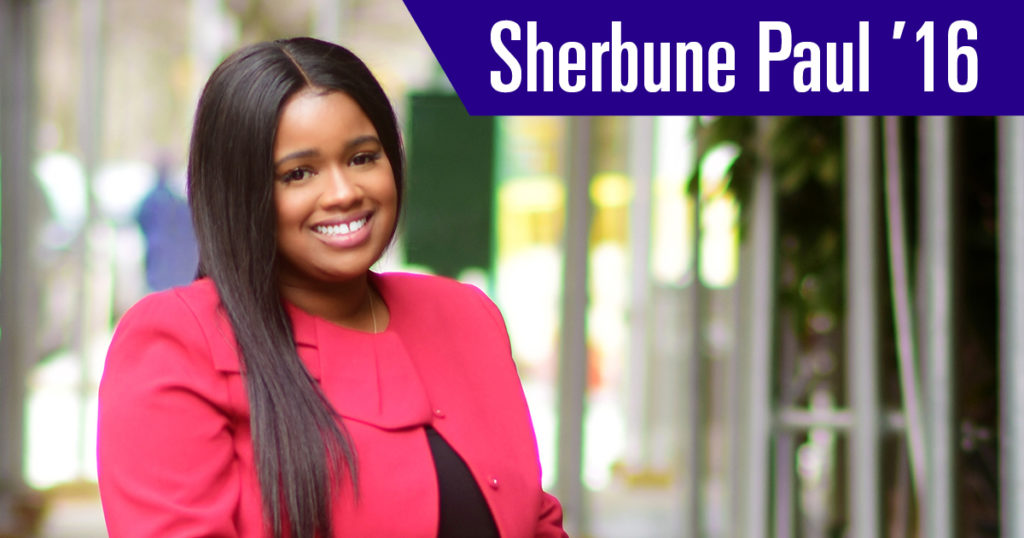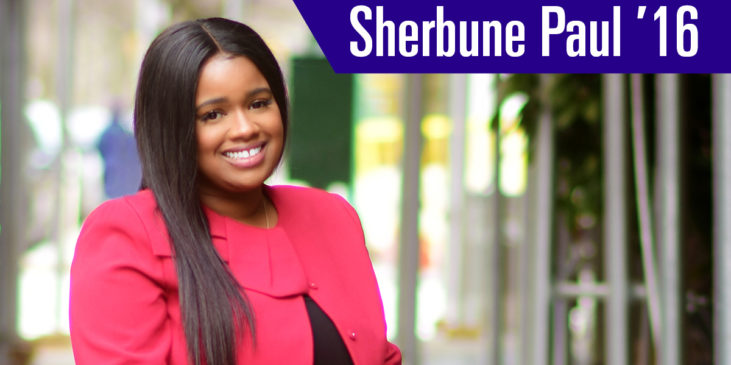
As a young child, Sherbune Paul ’16 wasn’t sure what lawyers did—but she knew she wanted to become one.
Paul’s mother, who had immigrated to America from Haiti, found that invoking her “lawyer” halted discriminatory or dismissive treatment from others (though the family did not have a lawyer). One day, Paul asked her mother about the meaning of the word.
“She said that a lawyer is a very powerful person who helps people,” Paul recalls. “In that moment, I thought, ‘That’s what I want to be when I grow up.’”
Paul is now a Supervising Attorney at the New York City Taxi & Limousine Commission. Tonight, she will be inducted as President of the Haitian American Lawyers Association of New York (HALA-NY).
Finding Community
The pathway from a childhood dream to an accomplished public service career was not easy. Paul, a proud first generation professional, graduated from the State University of New York at Stony Brook determined to study law. She navigated the law school application process on her own, and was accepted to several law schools.
“At the time, I didn’t know much more about being a lawyer than what I’d seen on TV,” Paul says.
She chose NYLS because she felt comfortable on campus.
“I knew that to be successful, as a first generation professional, I needed a community to stand behind me,” she says. “The Black Law Students Association, Dean Anthony Crowell, the professors—They all helped me by giving me the community I needed.”
At NYLS, Paul found opportunities to pursue public interest law. The child of immigrants, she was quickly drawn to the immigration nonprofit founded by Professor Lenni Benson, the Safe Passage Project. She also enrolled in NYLS’s Civil Rights Clinic and affiliated with the Impact Center for Public Interest Law. She interned with the state court system and at Brooklyn Defender Services.
“Over time, I saw the impact a lawyer can have on civil rights, voting rights, and immigration issues,” she says.
She also joined the Black Law Students Association (BLSA), where Joam Alisme ’14, who was BLSA President at the time, connected her to HALA-NY. Paul became the BLSA President after Alisme, and she considers him a mentor. In turn, she mentored the BLSA President who followed her, Samantha Dunac ’17.
“As it happens, we had three Haitian BLSA presidents in a row,” Paul laughs. “We’re a small community, and we stick together.”
Serving New Yorkers
After graduating from NYLS, Paul joined the New York City Administration for Children’s Services, where she prosecuted cases of child abuse and neglect. After two years in that role, she joined the Taxi & Limousine Commission.
The daughter of a former yellow cab driver, Paul now works to educate drivers on city laws and regulations. She also prosecutes violators. Many of her cases involve unlicensed vehicles, which can be unsafe and can prey on immigrant populations by charging exorbitant fees. Other cases involve drivers who refuse service to passengers based on race or another discriminatory basis. Paul, a Black woman, has experienced refusal of service first-hand.
“I’ve had drivers see me from the window, pass me by, and cancel the ride,” she says. “At this point in my life, as a lawyer, I have a lot of privilege. Imagine someone who looks like me and is treated the same way.”
Part of the solution, she believes, is a more diverse legal profession. As President of HALA-NY, Paul hopes to provide opportunities for more Haitian Americans to attend law school—and for lawyers to help protect the rights of community members. Her priorities include building HALA-NY’s membership, funding a law student scholarship, and providing access to legal services for New York City’s Haitian community.
She has established a theme, in Haitian Creole, for HALA-NY this year. It translates to “Stand together, rise together.”
Paul takes a similar approach to mentoring other first generation professionals.
“I grew up with very little means,” she says. “I want people to know that even if you’re coming from a background with little means, you can become a lawyer.”

